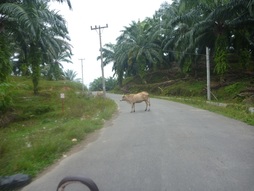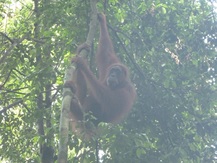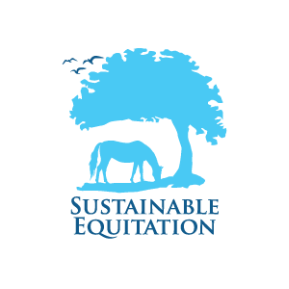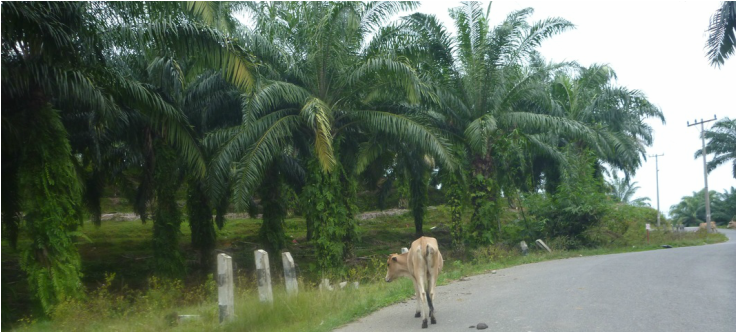
It's not every day you get to walk in the jungle with orangutans and their young, thomas leaf monkeys, long tail macaques, huge monitor lizards, hornbill toucans and countless other creatures. The sound of a tree falling in the jungle is something to behold, as is the feeling of being chased up a cliff edge by Jackie the grumpy orangutan - they are definitely better at climbing than us! We ate lunch (gluten free vegan of course!) out of a banana leaf by a waterfall followed by a mix of climbing, falling, controlled falling and abseiling using vines down the steep jungle to white water raft back down the river with local river boys.
Closer to the village and all around the cities near-by, the deep green of palm oil plantations stretches as far as the eye can see. The beauty of it is lost in the destruction and corruption left in its wake. The people are aware of the damage but left powerless. When you see the joy in their faces, listen to the friendly exchanges between locals and watch the way they live in their incredible surrounding so close to nature it is heartbreaking to watch it be destroyed while they struggle against their government to preserve it.
Closer to the village and all around the cities near-by, the deep green of palm oil plantations stretches as far as the eye can see. The beauty of it is lost in the destruction and corruption left in its wake. The people are aware of the damage but left powerless. When you see the joy in their faces, listen to the friendly exchanges between locals and watch the way they live in their incredible surrounding so close to nature it is heartbreaking to watch it be destroyed while they struggle against their government to preserve it.
Travelling these countries I sometimes I look around and am frustrated by the mess and the steady rhythm at which they work. In contrast to the madness at home and my complete inability to sit still when there are jobs to be done or projects to be created (or, more often, horses to be ridden!), it seems like there is so much that they could do to improve things if they just went a bit faster. It’s a very skewed and shallow view-point of course, and comes with its own set of issues, stresses and anguish.
I enjoy the way they seem to understand themselves, and the nature around them and returning home to the life I love, I feel privileged to have seen a small glimpse of the life of those where I have been. The tiny imprint we made on our way through is far smaller than the impact they had on us.
Palm oil is destroying more than just their environment. It is destroying their government - who are so corrupt they sell the land to other countries to farm for Palm Oil. It is destroying their people, their families, their animals, their water supply and in many cases destroying their hope. Unfortunately, along with the damage to the people of the communities near by the palm oil plantations, the damage stretches far and wide with Orangutans becoming critically endangered. Their gene pool is becoming very small with only 7000 left in the wild. It’s frightening to think about what happens when we have destroyed so many of our animal species that we have nothing but humans on the planet. What happens when we start messing with our own genetics in the same way and eventually we’re only left with a few, short-legged, hair-less, blind cripples running the earth?
I enjoy the way they seem to understand themselves, and the nature around them and returning home to the life I love, I feel privileged to have seen a small glimpse of the life of those where I have been. The tiny imprint we made on our way through is far smaller than the impact they had on us.
Palm oil is destroying more than just their environment. It is destroying their government - who are so corrupt they sell the land to other countries to farm for Palm Oil. It is destroying their people, their families, their animals, their water supply and in many cases destroying their hope. Unfortunately, along with the damage to the people of the communities near by the palm oil plantations, the damage stretches far and wide with Orangutans becoming critically endangered. Their gene pool is becoming very small with only 7000 left in the wild. It’s frightening to think about what happens when we have destroyed so many of our animal species that we have nothing but humans on the planet. What happens when we start messing with our own genetics in the same way and eventually we’re only left with a few, short-legged, hair-less, blind cripples running the earth?

Orangutans share over 96% of their genes with us. That is itself means very little given that even a mouse shares 92% of our genes and the weeds in the garden up to around 20%. But the difference with Orangutans is that they share many of our characteristics.
They are gentle with their young, incredibly strong, and have hair far softer than it looks. Each night, orangutans build a new nest to sleep in using leaves and vines. Some even make special pillows for their heads and when raining they often build a structure somewhat like a canopy to keep their heads dry. They have been known to walk along holding large leaves up like umbrellas during rainy season. One of the Orangutans at Bukit Lawang even worked out how to use the tug-along boat – pulling herself across the river on the line to get in to the village. Unlike horses, Orangutans can obviously learn by observation!
As we drank tea on our last morning in the village of Bukit Lawang a cobra floated down the river, hoped off to chill on the rocks near by for a few minutes and then hopped back in and floated away again. It’s hard to leave a place like that, where the wildlife is amazing and the people cheerful, friendly and helpful. But there are horses to be trained and riders to be coached so we returned home to our home and our incredible job feeling lucky to have seen and explored and lucky to be in a great country with a good future, doing something we love for a living.
They are gentle with their young, incredibly strong, and have hair far softer than it looks. Each night, orangutans build a new nest to sleep in using leaves and vines. Some even make special pillows for their heads and when raining they often build a structure somewhat like a canopy to keep their heads dry. They have been known to walk along holding large leaves up like umbrellas during rainy season. One of the Orangutans at Bukit Lawang even worked out how to use the tug-along boat – pulling herself across the river on the line to get in to the village. Unlike horses, Orangutans can obviously learn by observation!
As we drank tea on our last morning in the village of Bukit Lawang a cobra floated down the river, hoped off to chill on the rocks near by for a few minutes and then hopped back in and floated away again. It’s hard to leave a place like that, where the wildlife is amazing and the people cheerful, friendly and helpful. But there are horses to be trained and riders to be coached so we returned home to our home and our incredible job feeling lucky to have seen and explored and lucky to be in a great country with a good future, doing something we love for a living.


 RSS Feed
RSS Feed
